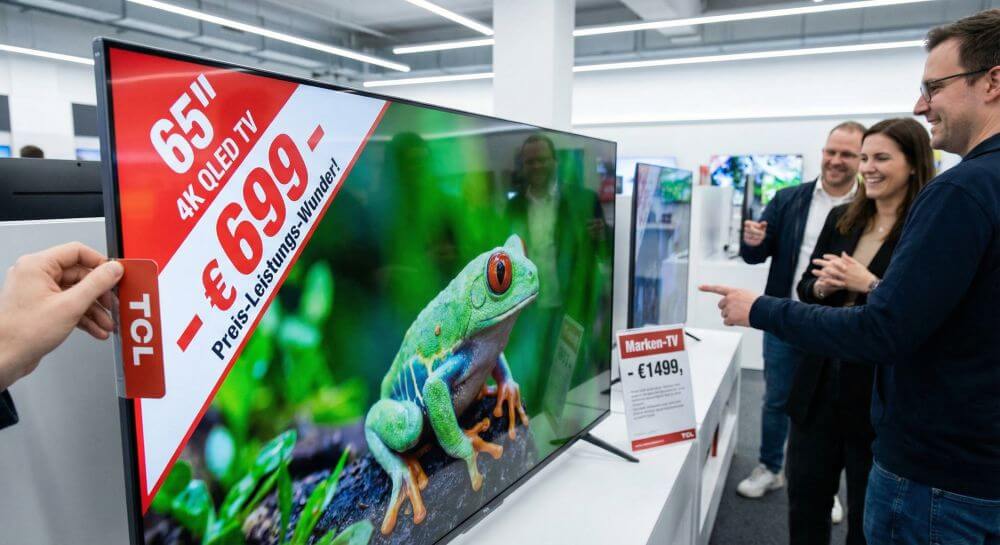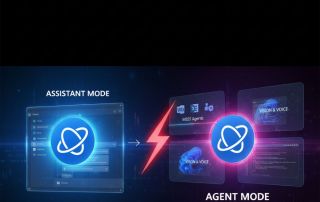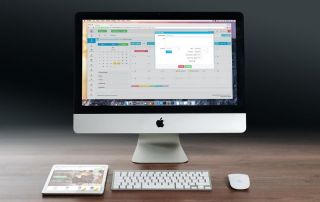TCL TVs: Price-performance marvel or cheap compromise?
Anyone who’s been looking for a large TV lately—especially 65 inches and up—has inevitably come across TCL. Their prices are often aggressively low, while their technical specifications read like those of high-end models. But can this approach be effective?
In this article, we’ll explore whether these TVs are any good, how they achieve such low prices, and how they compare to the competition.

Are the devices any good?
The short answer is: Yes, surprisingly much.
TCL used to be considered a purely budget brand (a “no-name” brand). That has changed drastically. Today, TCL is one of the world’s largest TV manufacturers and actively drives innovation.
Strengths
- Picture quality: Especially in the mid-range and high-end segments (often the C-series or QM-series), TCL offers features like QLED (better colors) and Mini-LED (high contrast and brightness), which often cost twice as much with other brands.
- Gaming: Many models support HDMI 2.1, 120Hz or 144Hz refresh rates, making them ideal for PS5 and Xbox Series X.
- Operating system: TCL mostly uses Google TV. This means a huge selection of apps and a modern interface (even if it sometimes runs a bit slower than on high-end devices).
The Weaknesses
- Upscaling & Motion Handling: This is where the biggest difference to Sony or Samsung lies. When watching a poor TV signal (SD/HD), more expensive processors upscale the image more cleanly than TCL. With 4K content (Netflix, Disney+), this is hardly noticeable.
- Viewing Angles: TCL often uses VA panels. These have great black levels, but the picture becomes washed out when viewed from the side.
- Quality Control: The variation in quality between individual units (the so-called “panel lottery”) can be somewhat higher with TCL than with premium brands.
How is such a low price even possible?
It seems almost suspicious that a 65-inch TCL Mini-LED TV costs €800, while a comparable Samsung costs €1,500. There are three main economic reasons for this:
A. Vertical Integration (CSOT)
This is the most important point. TCL isn’t just a brand that buys up components. TCL owns the panel manufacturer CSOT.
- TCL manufactures its own screens.
- Moreover, TCL often manufactures panels for other brands (Samsung and Sony also sometimes buy panels from TCL/CSOT).
- Because they “own the factory,” the profit margin of intermediaries is eliminated.
B. Aggressive Market Strategy
TCL pursues a market penetration strategy. They are prepared to operate with minimal profit margins per device to capture market share from Samsung and LG. Quantity over quality when it comes to profit.
C. Savings in Less Visible Areas
To drive down the price, savings are made in areas that aren’t immediately apparent on the spec sheet:
- Casing: Lots of plastic, often a bit thicker, less of a “premium feel”.
- Processor: As mentioned above, the image processor is good, but not world-class (less AI optimization).
- Factory Calibration: Colors are often not perfectly calibrated out of the box and must be adjusted by the user in the menu.
Who is actually behind TCL?
Many consumers still mistakenly believe TCL to be a small, no-name company that has only recently emerged. The reality is quite different: TCL is a Chinese technology giant that has been working diligently for decades to dominate the global market.
The Giant Behind the Scenes
Origin: The company was founded in 1981 in China as TTK (originally a manufacturer of audio cassettes) and later renamed TCL (“The Creative Life”). Founder Li Dongsheng still leads the company today.
- Market position: TCL is now the second-largest TV manufacturer in the world by sales volume. They have overtaken LG and are now chasing Samsung.
- European roots: To gain a foothold in the West, TCL bought the TV division of the traditional French brand Thomson in 2004 (and the RCA brand in the USA). Anyone who owned a Thomson television back in the day often technically already owned a device from the TCL universe.
- The secret weapon: CSOT (China Star Optoelectronics Technology)
- This is the most important point to understand: TCL isn’t just a brand that slaps its label on other people’s devices. With its subsidiary CSOT, TCL owns one of the largest and most modern display factories in the world.
- The competitor’s supplier: CSOT doesn’t just produce panels for TCL televisions. Samsung, Sony, and many other major brands often source their LCD panels from TCL/CSOT.
Why this is important: When you buy an expensive, brand-name TV, there’s a good chance the screen itself is actually made by TCL. TCL leverages this home advantage: They use their own best panels (like high-end VA panels with Mini-LED technology) in their own budget-friendly devices, while the competition has to buy these panels at a high price.
Behind the low price is therefore not a “cheap importer”, but a highly integrated industrial titan that controls the entire value chain – from the raw glass for the display to the finished television in the living room.
Comparison: TCL vs. the competition (65 inch +)
Let’s take a look at what you can get if you have a budget of around €600 to €1,000 for a 65-inch TV.
The main rival: Hisense
- The duel: Hisense is the direct competitor from China. The strategy is almost identical.
- Comparison: Both offer Mini-LED and QLED at incredibly low prices. Hisense often has its own operating system (VIDAA), which is very fast, but has fewer apps than Google TV on TCL.
- Conclusion: A neck-and-neck race. The current daily deal often decides the choice.
The market leaders: Samsung (Crystal UHD / QLED entry-level)
For the price of a top-of-the-line TCL, Samsung often only offers entry-level models (Crystal UHD) or basic QLED TVs (Q60 series).
- Comparison: The Samsung will likely have a better menu and better upscaling for TV channels. However, the TCL will be brighter, have true local dimming (for better black levels), and often offer 120Hz, whereas the cheaper Samsung only has 60Hz.
- Conclusion: If you only watch linear TV, go for Samsung. If you stream movies and play games, you get more hardware for your money with TCL.
The premium league: LG & Sony
- LG: In the budget segment, LG often uses IPS panels. These have great viewing angles, but weak contrast (gray instead of black in the dark). Here, TCL, with its VA panels, outperforms LG in terms of image depth in dark rooms.
- Sony: Sony is hardly competitive in this price range. A Sony X90L (mid-range) significantly outperforms the TCL in image processing, but often costs 50–80% more.
Overview table (65 inch class)
| Brand / Type | Image quality (price/performance ratio) | Gaming Features | operating system | Best scenario for buyers |
|---|---|---|---|---|
| TCL (C-Series/QM) | ⭐⭐⭐⭐⭐ | 120/144Hz is often standard | Google TV (Very good) | Gamers and streamers with a budget |
| Hisense (U-Series) | ⭐⭐⭐⭐⭐ | Very good | VIDAA (Fast, fewer apps) | Alternative to TCL |
| Samsung (Entry-level) | ⭐⭐⭐ | Often only 60Hz | Tizen (Very good) | Classic TV program |
| LG (UHD Entry) | ⭐⭐⭐ | Oft nur 60Hz | webOS (Very good + Magic Remote) | Bright living rooms, sports (wide viewing angle) |
| Sony (X-Series/Bravia) | ⭐⭐⭐ (because of high price) | 120Hz (only mid-range and above) | Google TV (Excellently optimized) | Film lovers who want the best motion handling and upscaling |
Conclusion
Are TCL TVs any good? Absolutely!
TCL has managed to bridge the gap between “cheap junk” and “premium.” They offer high-end hardware (Mini-LED) at mid-range prices. The low price isn’t a scam, but the result of sound business practices: they save on the casing and marketing, but own the factories for the most important components themselves.
My recommendation: If you’re looking for a 65-inch TV (or larger) and your budget is limited, you’ll almost always get a better picture from TCL (or Hisense) than from entry-level models from Samsung or LG. However, if you’re a videophile seeking absolute color perfection and the best motion handling, you’ll still have to dig deep into your pockets and opt for Sony or OLED models from LG/Samsung.
Beliebte Beiträge
From assistant to agent: Microsoft’s Copilot
Copilot is growing up: Microsoft's AI is no longer an assistant, but a proactive agent. With "Vision," it sees your Windows desktop; in M365, it analyzes data as a "Researcher"; and in GitHub, it autonomously corrects code. The biggest update yet.
Never do the same thing again: How to record a macro in Excel
Tired of repetitive tasks in Excel? Learn how to create your first personal "magic button" with the macro recorder. Automate formatting and save hours – no programming required! Click here for easy instructions.
IMAP vs. Local Folders: The secret to your Outlook structure and why it matters
Do you know the difference between IMAP and local folders in Outlook? Incorrect use can lead to data loss! We'll explain simply what belongs where, how to clean up your mailbox, and how to archive emails securely and for the long term.
Der ultimative Effizienz-Boost: Wie Excel, Word und Outlook für Sie zusammenarbeiten
Schluss mit manuellem Kopieren! Lernen Sie, wie Sie Excel-Listen, Word-Vorlagen & Outlook verbinden, um personalisierte Serien-E-Mails automatisch zu versenden. Sparen Sie Zeit, vermeiden Sie Fehler und steigern Sie Ihre Effizienz. Hier geht's zur einfachen Anleitung!
Microsoft 365 Copilot in practice: Your guide to the new everyday work routine
What can Microsoft 365 Copilot really do? 🤖 We'll show you in a practical way how the AI assistant revolutionizes your daily work in Word, Excel & Teams. From a blank page to a finished presentation in minutes! The ultimate practical guide for the new workday. #Copilot #Microsoft365 #AI
Integrate and use ChatGPT in Excel – is that possible?
ChatGPT is more than just a simple chatbot. Learn how it can revolutionize how you work with Excel by translating formulas, creating VBA macros, and even promising future integration with Office.

































